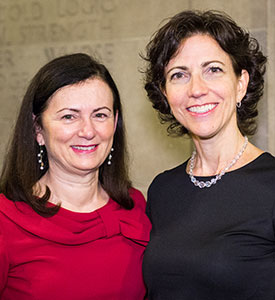Working miracles, one baby at a time
Giving our most vulnerable patients – preterm infants – a fighting chance at survival with donated breastmilk

Dr. Deborah O’Connor and Dr. Sharon Unger
Photo credit: University of Toronto
CIHR Foundation Grant Recipients
Dr. Deborah O’Connor
Professor, Faculty of Medicine
University of Toronto
Dietitian & Senior Associate Scientist
The Hospital for Sick Children
with
Dr. Sharon Unger
Associate Professor, Faculty of Medicine
University of Toronto
Neonatologist and Clinical Investigator
Mount Sinai Hospital
Dr. O’Connor’s and Dr. Unger’s Research
The gestation period of humans is about 266 days, with a full-term pregnancy lasting almost 40 weeks. Infants born before 37 weeks of gestation are considered to be preterm. Because their tiny organs and immune systems are still developing, preterm infants or “preemies,” are extremely fragile and run a very high risk of developing life-threatening complications, including heart and respiratory problems, bleeding in the brain and infection. Preterm birth also triggers a nutritional crisis for the baby.
These babies, among Canada’s most fragile patient population, gain the most from the many known benefits of mother’s milk. This nourishment provides the nutrition needed for optimal growth and development of the gastro-intestinal, neurological and immunological systems that allow them to enjoy a high survival rate. For instance, by helping to colonize the digestive tract with healthy bacteria, dangerous gastro-intestinal complications can be minimized, or avoided entirely.
Preterm births may be rife with complications, which often compromise a mother’s ability to lactate. In the past, supplementation with bovine infant formula was the only alternative. But experts agree: there is no substitute for nature’s special blend of nutrients and bio-actives found in breastmilk.
Addressing the dilemma of mothers who are unable to produce a full volume of milk, Dr. Deborah O’Connor and Dr. Sharon Unger have dedicated their careers to finding more efficient methods to generate a sufficient supply of human milk. They have become leaders in advancing the care of preterm infants, with a special focus on the nutrition of very low birthweight infants (VLBW).
Through their research, clinical work and milk banking, as well as their capacity to build networks and to lead cooperative efforts, they have been helping the tiniest and most vulnerable individuals to not only survive, but to grow up to live long, healthy lives.
The launch of the Rogers Hixon Ontario Human Milk Bank, a collaboration of the Hospital for Sick Children, Sunnybrook Health Sciences Centre and Mont Sinai Hospital, was the culmination of a concerted effort to provide neonatal units with a secure source of safe donor milk, rich in immunoglobulins, hormones and growth agents.
Borrowing techniques from the dairy industry, such as pasteurization, donated human milk is treated with great care, maintaining the highest safety standards. Distributed via prescription to hospitalized VLBW babies, the banked human donor milk has been credited with saving countless little lives.
These innovations in human milk provision for VLBW infants are yielding encouraging results. But more vital work remains to be done.
Funding Nutritional Advances for Very Low Birthweight Infants
Dr. O’Connor and Dr. Unger have collaborated on three previously successful research initiatives focusing on the use of human milk in neonatal intensive care units. The Donor Milk for Improved Neurodevelopmental Outcomes (DoMINO) study explored the value of human milk versus formula for VLBW babies when there is an insufficient volume of mother’s own milk. It was followed by the Microbiome, gut microbial community and potential metabolic activities (microDoMINO) study that examined stool samples to confirm gut health in VLBW babies.
More recently, the Optimizing Mother’s Milk for Preterm Infants (OptiMoM) Program of research was launched. It incorporates three randomized control trials while simultaneously working to build capacity within Canada for neonatal nutrition research. This is being accomplished by training a large number of graduate students and fellows from inter-disciplinary fields as well as by expanding an established consortium of collaborating Neo-natal Intensive Care Units which can efficiently test and implement nutritional strategies. The core studies include the outcomes of kindergarten age DoMINO patients, the optimal protein supplement dose, and a human milk based multi-nutrient fortifier.
Hoping to build on these successful research projects, their latest endeavor, Maximizing Mother’s Milk for Pre-term Infants (MaxiMoM) study will develop nutritional guidelines for VLBW babies, as well as national protocols for human milk handling and pasteurization, so that valuable nutrients and bio-actives are preserved.
Currently leading a multi-disciplinary team spanning more than 20 Canadian neonatal units, Dr. O’Connor and Dr. Unger are at the vanguard of innovations in quality nutritional care for preemies. They have become international leaders in developing methods for optimizing human milk for VLBW babies, and generations of preemies are growing up healthy thanks to their work.
About the Researchers
Dr. Deborah O’Connor completed her Doctorate in Philosophy at the University of Illinois, after earning a Master of Science degree. She is a full professor in the Department of Nutritional Sciences at the University of Toronto’s Faculty of Medicine and a dietitian and senior associate scientist in the Physiology and Experimental Medicine Program at the Hospital for Sick Children’s Research Institute.
Dr. Sharon Unger earned her Doctorate in Medicine at Dalhousie University and subsequently completed a fellowship in Neonatal-Perinatal medicine at the University of Toronto. She is also an Associate Professor at the University of Toronto’s Faculty of Medicine and Clinical Investigator (Pediatrics) at Mount Sinai Hospital and the Medical Director of the Rogers Hixon Ontario Human Milk Bank.
- Date modified: